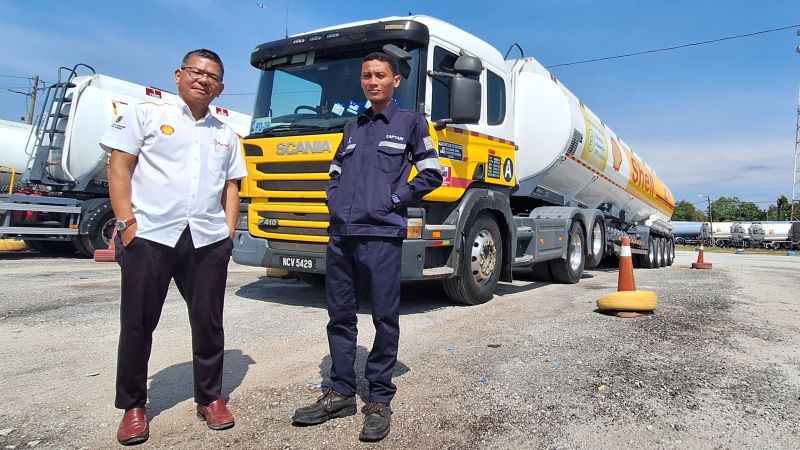Using B100 – What You Need to Know

Alternative fuels come in various shapes and forms. In Malaysia, Biodiesel is a natural choice as it is available in relatively large amounts as fuel for road transportation. In contrast to other new energy forms, setting up the required infrastructure is easier too.
In November 2023, Scania (Malaysia) Sdn Bhd (Scania) and Shell Malaysia Trading Sdn Bhd (Shell) launched the pilot test of the first pair of Scania road tankers, operated by Konsortium Port Dickson Sdn Bhd (KPD), running solely on B100 Biodiesel. After six months, the project team has compiled a number of insights that are useful for those planning to make a switch to B100.
In the Yard
As palm oil has a special status in Malaysia, there may be licences required to store B100 Biodiesel. However, according to the project team, that is not a major stumbling block and just needs to be handled accordingly. B100 is just as flammable as Diesel, hence it being a good substitute; however, B100 is a little bit more corrosive. The same care as handling other flammable items should be applied. Considering that B100 is not readily available across the country, one may want to have own tanks. It is recommended to separate the different fuels.
The Truck
Because of the properties of B100, trucks need to be prepared for the use of this fuel. Biodiesel is more hygroscopic and thus, a water separator may be required. Those having acquired Scania trucks recently can count themselves lucky as the Swedish marquee offers their vehicles as FAME prepared (FAME is the abbreviation for Fatty Acid Methyl Esters, which is the technical term for the biodiesel that is produced in Malaysia). It is a known fact that Biodiesel has a lower energy content than Diesel, hence a drop in power of the engine is to be expected. This drop in power is however not severely impacting the performance of the vehicle. Depending on the mission, the drop in power may not have any consequences: for instance, operating smaller trucks in urban areas moving light cargo.
Environmental Impact
Through the trial, having clocked 100 000 kilometres on the two Scanias, the significant reduction of CO2 emissions was confirmed. Expected to be around 70 percent reduction, the trial showed that this is a realistic number. This is significant as an extrapolation of these numbers would indicate that the road transport industry could drastically reduce these harmful emissions by switching to B100. Looking at the ambition to reduce emissions, we have to evaluate how effective Biodiesel is to be a faster, more economical way to reduce CO2 emissions. In Malaysia today, it is the most economical way to reduce CO2 emissions beyond 10 percent which one can get from fuel savings. It won’t get transporters all the way to carbon neutral like you can do if your run a battery electric vehicle on renewable electricity; but it can get you to 70 percent reduction for cost premium of 5-15 percent based on the current palm oil price.
In summary, Tee Chu Wong, Managing Director of Konsortium Port Dickson Sdn Bhd said that Biodiesel is a fantastic option for those wanting to make a difference. With relative low investment needed to equip the trucks and operation for the use of Biodiesel, this is the most viable way to make an immediate impact on the eco-balance sheet. For now, the limited availability, in tandem with the increased cost at the pump can be seen as hindrances for transporters to make a move to this fuel. He also praised Scania for making the effort to have the vehicles FAME prepared as a standard. One aspect that many may overlook is that use of Biodiesel will also support the local economy as Malaysia is a major palm oil producer. Overall, the trial has been a positive experience whereby KPD managed to learn a lot about Biodiesel and how to optimise the use of various fuels.